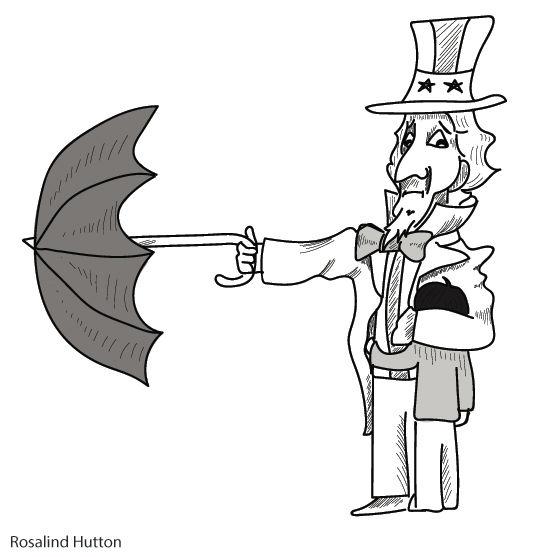In June of this year, protests erupted in the People’s Republic of China’s autonomous special administrative region of Hong Kong over China’s proposal to allow extraditions from Hong Kong to China. China and Hong Kong currently operate under a governance style they refer to as “one country, two systems,” wherein Hong Kong exists as a region of China, but maintains the greatest degree of autonomy China can grant to one of its regions.
Hongkongers protesting the proposed extradition agreement fear it will allow China to arrogate more influence and control over Hong Kongese politics than should be permitted under their current two systems model. The younger Hongkongers have expressed additional concerns over the eventual merger between the two states, scheduled for 2047. Though Western media such as the BBC have covered the Hong Kong protests, I have yet to see the outrage and assistance I would have hoped we and our democratic allies would offer.
Canadian Prime Minister Justin Trudeau and Australian Prime Minister Scott Morrison are examples of world leaders who have cautioned China’s brutal response to the “legitimate” protests, but the President of the United States, Donald J. Trump, has demonstrated what I would describe as a more than lackluster response, verging on turning his back on the democratic norms for which our country is expected to advocate. CNN’s Jim Sciutto, Gloria Borger and Jeremy Diamond reported Trump pledged U.S. silence on the protests to Chinese President Xi Jinping, and the U.S. State Department instructed its general counsel in Hong Kong to cancel a scheduled speaking engagement in which he would address the protests.
This response does nothing to help Hongkongers advocate for democratic values and norms; rather, it displays the U.S. turning a blind eye to those same principles as they falter to an authoritarian regime.
One may ask why the U.S. and other Western nations should involve themselves in the internal affairs of one of the world’s largest economic and military powerhouses, and I can think of no better and more relevant example than China’s handling of its Tibet Autonomous Region, which previously existed as the independent Kingdom of Tibet for hundreds of years, but was absorbed into China in 1951. Tibetans developed their own religious, cultural and political norms during their independence, but their incorporation into China marked the end of most of these norms when Chinese control and influence that was contrary to their former lifestyle was thrust unto them, leading to the eventual exile of their most important and influential religious figure, the Dalai Lama.
Human rights violations by China against Tibetans have been rampant since Tibet’s incorporation into China, as recently reported by Alim Seytoff of Radio Free Asia. The world stood by, accepting China’s status quo of authoritarian perversion of the Tibetan culture, offering little more than the calls for peace we are seeing from many of the world’s leaders today. This resulted in the Chinese feeling empowered to know they can invade and erode other civilizations without recourse.
Tibet, however, does not stand alone as the only victim of China’s unchecked expansionism and human rights violations. The Xinjiang Uygur Autonomous Region also suffers from similar cultural erosion and human rights violations by the Chinese government.
Amnesty International released an article in which they urged the secretary general of the United Nations to swiftly and fiercely condemn the Chinese government’s egregious violations of human rights in Xinjiang, as they oppress Xinjiang’s native Muslim population by forcing them into internment camps, intrusively surveil Muslim worshipers and force Uygur Muslims to abandon their cultural norms in favor of the authoritarian values advocated by the Chinese government. Xinjiang stands as another example of what could become the reality in Hong Kong if the international community does not more aggressively defend the principles that have allowed democratic societies with basic human freedoms to flourish.
Macau and Taiwan are two other autonomous regions within China that could face similar fates to Xinjiang and Tibet, if China is allowed to freely erode Hong Kongese norms. Whereas I cannot say with an unwavering degree of certainty what the international community’s response to China’s egregious actions in Hong Kong should be, I know options exist aside from spineless and relatively meaningless calls for a cessation of violence.
Perhaps we should advocate for total independence from China for Hong Kong, Tibet, Xinjiang, Macau and Taiwan? Perhaps we should sanction China for violating international law vis-à-vis their human rights violations? That is for our leaders to decide. What we can do in the meantime is raise awareness of these issues, virtually join Hongkongers as they advocate for freedoms and stand unwavering in our support for democratic values and norms, especially with regards to freedom of religion, freedom of speech and freedom of assembly.
Categories:
Hong Kong deserves American attention

Hong Kong Deserves Attention
0
Donate to The Reflector
Your donation will support the student journalists of Mississippi State University. Your contribution will allow us to purchase equipment and cover our annual website hosting costs.
More to Discover





